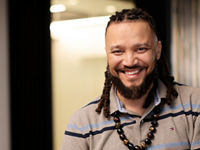I was born and grew up in Gansu province, China. My grandparents were from what we called “the countryside” in China — a more remote, mountainous area steeped in Chinese cultural traditions.
However, my parents lived in an urban environment and sought education to achieve a good life and have better job opportunities. Both have bachelor’s degrees and like many Chinese households, they emphasized the need to study hard throughout my life. My family still lives in China, and they have no plans to emigrate because they are comfortable with Chinese culture. I do visit when I can.
At age five, I started to learn a Chinese traditional instrument called Gu Zheng. It is a string instrument with more than 2000 years of history. As I grew older and developed my own taste in music, I found another instrument called Gu Qin. Gu Qin and Gu Zheng are very similar string instruments — even a lot of Chinese confuse them. But the music styles, the vibes they deliver, are very different. I like how Gu Qin could express peaceful but rich emotions. After learning it, I realized it requires the player not only have playful techniques but also long-term learning of culture ideology in order to achieve self-cultivation.
As early as age 16, my parents set me on a path that included preparation for international study, likely in Canada or the United States. During high school, which is a three-year program in China, I was exposed to as much American culture as possible. In addition to offering traditional classes, our high school also offered a special program for students who might study abroad, such as SAT testing in English and tutorials in English.
My mother was especially a driving force behind my education in China. She knew that even though having me leave the family was a hard decision, it would lead to a better future with more life opportunities. And so, I came to America in 2011 at age 18 when I graduated high school. I knew my identity was no longer just Chinese but also Asian. I expected to be treated differently than Asian Americans, since I was not born here, nor did I grow up here. The school environment, my circle of friends, and the environment where I worked were respectful to me. I think it has something to do with “Minnesota-nice.” I heard about hate crimes that targeted innocent Asian people during the last three years of the pandemic, but because of the social circle I chose, my personal experience was peaceful.
Coming to America alone as an international student was hard mentally and academically. I’ve always been a quiet person, which turned out to be both good and bad. Americans respect others’ personal space and the need for individuality, which is good. But sometimes, I did miss having people ask me how I was doing and kindly giving me advice. Being comfortable speaking English and acclimating to American culture was a slow experience.
Things I learned in school had to be translated into Chinese for my understanding, and what I wanted to say was written in Chinese first and then translated into English, which significantly lengthened study time. My English has gradually improved, and I no longer need the Chinese translation buffer. However, not being proficient in the language and lacking familiarity with customs and idioms is still a challenge. Sometimes I don’t get my husband’s jokes, and asking for clarification makes it not a joke anymore!


